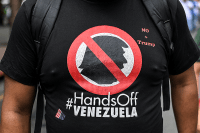Compare the world 20 years after the 9/11 attacks to the world two decades after Pearl Harbour. World War Two was a vivid presence in popular culture and national memory in 1961, but America in the first year of John F. Kennedy’s administration was in no sense living in the shadow of Japan’s attack. That war had ended 15 years ago; Japan was now our ally in the Cold War with the Soviet Union.
Twenty years after 9/11, the US has only just ended its war in Afghanistan, and the result of that conflict, which lasted five times longer than the one with Imperial Japan (and Hitler’s Germany), was the immediate return to power of the regime we set out to depose at the start.
After Afghanistan, the US is still fighting a War on Terror against al-Qaeda and similar groups. The foreign-policy community continues to dream of bringing regime change to the Islamic world, while weapons of mass destruction at the disposal of the ‘Axis of Evil’ remains a preoccupation of our diplomats and think-tankers, or tank-thinkers.
Like a classic war of religion, its objective is the claiming of territory for the faith and ultimately the conversion of the people who live there
This is what ‘forever war’ means. And in fact, it began at least a decade before 9/11, with the 1991 Persian Gulf War that didn’t really conclude successfully and cleanly but instead became an open-ended policing operation over the skies of Iraq and in the purported deports and workshops of Saddam Hussein’s WMDs. Congress was still fighting the Gulf War in 1998 when it passed the ‘Iraq Liberation Act’, five years before George W. Bush invaded in full force.
1998 was also the year Bill Clinton’s administration launched air strikes against al-Qaeda camps in Afghanistan (and Sudan) in retaliation for the group’s attacks on US embassies in Kenya and Tanzania earlier that year. Terrorists with al-Qaeda connections had previously bombed the World Trade Centers in 1993, and al-Qaeda would strike the USS Cole in 2000. The 9/11 attacks were not the start of something, a moment in which ‘everything changed’, but an intensification. So was the US response.
Iraq and Afghanistan were already theaters of conflict, though they would become much bloodier in the 2000s. Everything the US had done up to 9/11 — the Gulf War, the airstrikes, economic and diplomatic sanctions — failed to curtail the problem. The invasion of Afghanistan after 9/11 did seriously degrade al-Qaeda, and bin Laden himself eventually met a deservedly violent end. But surprisingly little else is resolved. Iraq is no longer much covered by the US media, yet its fate remains precarious. In 10 years’ time, Afghanistan might not be the only place where the post-American order looks appalling like what came before.
To say that the War on Terror is unwinnable because it’s a war on an abstraction is true enough. In practice, however, the War on Terror is simply a name that’s been slapped on America’s post-Cold War engagement with hotspots in the Islamic world. That isn’t a war on an abstraction, but it is a war of a curious character. It’s not like war with Japan or the Cold War with the Soviet Union. So what sort of conflict is it?
It’s a war of religion. And like a classic war of religion, its objective is the claiming of territory for the faith and ultimately the conversion of the people who live there. This is what it means to bring liberalism and democracy to Iraq or Afghanistan, or indeed to the Islamic world as a whole. The 1991 Gulf War had more limited objectives, of course, but those objectives proved to be self-unlimiting. We rescued Kuwait — and maybe by proxy Saudi Arabia — but this left a lingering question of what to do about Iraq. The only answer, according to the secular religion of America’s leadership class, was conversion. Iraq must become liberal and democratic one way or another — by sanctions, by threats, by invasion, by occupation. This would redeem Iraq, and Iraq would redeem its neighbors, above all Iran.
The reality, of course, is that Shi’ite militias wield much of the power in democratic Iraq, and Iran exerts a considerable influence on its neighbor, not the other way around. In Afghanistan, where the American work of proselytizing was ongoing for 20 years, the old heathenism was never stamped out and speedily reasserted command once the armed missionaries left.
Groups like al-Qaeda make explicit claims to be waging religious war or jihad. Most Muslims reject them. That rejection is not, however, the same thing as embracing the secular religion we have tried to export. Yet because our goals are indeed religious, not merely pragmatic, all the military skill and financial resources we bring to bear on countries like Afghanistan and Iraq fail to achieve our ultimate aims. Overthrowing a dictator is easy — redeeming a people is not only hard, it’s unintelligible in strategic terms.
The Taliban’s success might suggest otherwise, but the Taliban’s goal is not redemption, it’s submission. And the Taliban are a native force, with roots in the land as well as in faith. The paradoxical aim of Western elites when they make plans for the Islamic world is to build not a humble, functional, imperfect earthly order, but the City of God — only without God. This is so far from being feasible that the time and resources required to achieve it cannot be anything less than infinite.
Terrorists like bin Laden have often sought to justify their crimes by claiming to act in defense of their faith. Bin Laden was even known to claim that al-Qaeda’s existence was partly inspired by the sacrilegious presence of US troops in the holy land of Arabia. The mundane truth is that bin Laden wanted power, and anti-Americanism was a path to that. A garden-variety dictator like Saddam Hussein had power in one sense, but bin Laden wanted something different and potentially greater — al-Qaeda was internationalist in orientation from the beginning. Its founder wanted to be a revolutionary. His religion was entwined with that.
Perhaps ironically, Western policymakers are the opposite: they think of themselves as revolutionaries, when they are more like theologians. They believe that their faith is the end of history itself, and if only a strange people can be introduced to it, they will invariably adopt it. How can they fail to, when its truth is so obvious? Western leaders were not always like this, but the end of the Cold War taught a new generation of leaders — baby boomers like Bill Clinton and George W. Bush — all the wrong lessons.
The wars John F. Kennedy fought, the Pacific War in which he served and the Cold War he waged as president, had attainable ends, however idealistically they might be portrayed in propaganda. The wars of the post-Cold War era have drifted toward unattainable visions, whose academic and technocratic articulation only serves to distract from their basically eschatological character. So these wars are never won — not 30 years after the Gulf War and 20 years after 9/11.






Comments